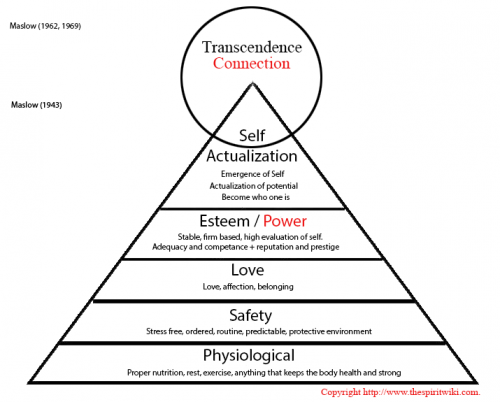Self-Actualization
An Avatar.Global Resource

Self-actualization is the fifth set of Needs as specified by Abraham Maslow (Maslow, 1943). Above self-actualization is the need for transcendence (or connection), below are the needs for power, love, safety, and the biological needs of the body (physiological needs). In Maslow's words, self actualization is "...the desire for self-fulfillment, namely, to the tendency for him [sic] to become actualized in what he is potentially. This tendency might be phrased as the desire to become more and more what one is, to become everything that one is capable of becoming." (Maslow, 1943: p. 382). As Maslow notes, the specific form of the needs varies from individual to individual. For some self actualization entails working towards being the ideal mother, in others it is to be a perfection musician, and so on.
"The self-actualizing people I talk about are very healthy people, psychiatrically and psychologically healthy people. They could be called a superior segment of the population. Thus I, and others, have been studying not the whole human species, in an ordinary statisticiitl sense'), not the average of the species, but a select sample, i.e., the most creative or most talented or perhaps most intelligent that we could find." (Maslow, 1969, p. 5)
"BY definition, self-actualizing people are gratified in all their basic needs (of belongingness, affection, respect, and self-esteem). This is to say that they have a feeling of belongingness and rootedness, they are satisfied in their love needs, have friends and feel loved and loveworthy, they have status and place in life and respect from other people, and they have a reasonable feeling of worth and self-respect. If we phrase this negatively - in terms of the frustration of these basic needs and in terms of pathology - then this is to say that selfactualizing people do not (for any length of time) feel anxiety-ridden, insecure, unsafe, do not feel alone, ostracized, rootless, or isolated, do not feel unlovable, rejected, or unwanted, do not feel despised and looked down upon, and do not feel deeply unworthy, nor do they have crippling feelings of inferiority or worthlessness (Maslow, 1967, p. 93).
when basic needs met, move beyond self actualization to metamotivation, meta needs (Maslow, 1967)
It is my strong impression that the closer to self-actualizing, to fullhumanness, etc., the person is, the more likely I am to find that his &dquo;work&dquo; is metamotivated rather than basic-need-motivated. For more highly evolved persons, &dquo;the law&dquo; is apt to be more a way of seeking justice, truth, goodness, etc., rather than financial security, admiration, status, prestige, dominance, masculinity, etc. When I ask the questions: which aspects of your work do you enjoy most ? What gives you your greatest pleasures? ~1’hen do you get a kick out of your work? etc., such people are more apt to answer in terms of intrinsic values, of transpersonal, beyond-the-selfish, altruistic satisfactions, e.g., seeing justice done, doing a more perfect (Maslow, 1967, p. 102).
References
Maslow, A. H. (1943). A Theory of Human Motivation. Psychological Review, 50(4), 370-396.
Maslow, A. H. (1962). Lessons from the Peak-Experiences. Journal of Humanistic Psychology, 2(1), 9-18. doi: 10.1177/002216786200200102
Maslow, A. H. (1969). The farther reaches of human nature. Journal of Transpersonal Psychology, 1(1), 1-9.
